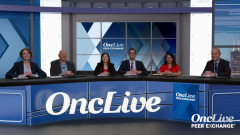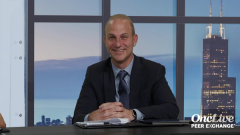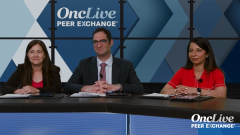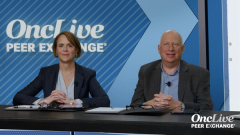
Adjuvant IO Therapy in Early-Stage NSCLC: The IMpower010 and PEARLS Trials
Expert perspectives on use of immunotherapy in the adjuvant setting of early-stage NSCLC in light of data from IMpower010 and PEARLS.
Episodes in this series

Transcript:
Benjamin Levy, MD: Let’s move on for the sake of time to adjuvant immunotherapy. Heather, you’ve been leading the charge on this, your first author on the paper in [The Lancet] with adjuvant atezolizumab, the IMpower010 trial [NCT02486718]. Can you walk us through that data? You know it well and just what we saw with adjuvant immunotherapy.
Heather Wakelee, MD: There have been 4 large, randomized trials looking at adjuvant immune therapy. This is the first with data and randomized patients who had completely resected stage IB to stage IIIA disease. They all had to get chemotherapy and then randomized to get atezolizumab for a year, so only a year or just best supportive care. The study was designed with a sort of hierarchical testing with the first look to be the stage II to IIIA patients who had some PD-L1 expression. That was the vast majority of the patients. There were only about 10% to 12% who had stage IB, so most had stage II and IIIA. And when we look at the PD-L1 expression, it was in over half the patients, so 55%. In that subgroup, the disease-free survival [DFS] hazard ratio is 0.66, and that led to FDA [US Food and Drug Administration] approval for that group of patients, which I think was the right thing to do. We’re still waiting for maturity with the stage IB and obviously need to see overall survival [OS]. Is that hazard ratio as good as what we saw with osimertinib in ADAURA? No, but the difference is with immunetherapy.When we think about the PACIFIC [trial; NCT02125461], their disease-free survival translated into an overall survival, which was parallel. When we’re talking about stopping the targeted TKIs [tyrosine kinase inhibitors], we don’t know that that persists and maybe staying on a drug lifelong, isn’t a bad thing. It’s a different way of thinking about it. The other thing that’s important to note with the IMpower010 data is that that benefit was really driven primarily by patients who had the higher PD-L1 expression on their tumors. In that subgroup with high PD-L1 greater than 50% that progression-free survival hazard ratio is 0.43. That is really good. With chemotherapy, it’s 0.86 for disease-free survival. That OS was similar too. That’s exciting. We also have the PEARLS trial [ NCT02504372], which was with adjuvant pembrolizumab. That was also presented just a few months back. Their overall hazard ratio for DFS is similar. It’s like 0.76 in all-comers, regardless of PD-L1 expression, but what makes no sense is it didn’t matter what the PD-L1 was so there wasn’t increased benefit with high PD-L1. It was not. It was not as good. That is a little odd. Then when you look at the data and the patients who did have EGFR mutations, it’s also confusing because they seem to benefit in both trials, but in IMpower010only if they had PD-L1 expression. Adding to our earlier conversation in the subset that had an ALKtranslocation, even if they had super high PD-L1, no benefit at all. If you gave them immune therapy, you weren’t helping them. That’s where we get back to we got to look for everything because then there are other drivers like KRAS, where you know immune therapy’s more likely to work. We have to really know the full story of the tumor before making decisions, but I’m super excited about immune therapy in the adjuvant setting. We’re obviously waiting to see more OS data. The initial hints were good in both studies.
Benjamin Levy, MD: You mentioned the PD-L1–high group benefited more. Are you comfortable giving this? Is there a patient you wouldn’t give this to and are you comfortable giving this to the 1 to 49s?
Heather Wakelee, MD: I don’t give it to patients who do not have PD-L1 expression in their tumor. I am not giving it to patients who have an EGFR mutation, an ALK translocation, or another driver that is a driver that in metastatic tells us immune therapy’s less likely to work. We don’t have definitive adjuvant data there because there weren’t big enough numbers to look at and we didn’t do that full testing but I get nervous that I don’t think I’m really helping them. I will give it to the 1 to 49, but with discussion and saying it like this;“We don’t know how much benefit there is. It was trended but it wasn’t statistically positive in that group and I think we need longer-term follow-up.” We need to see what that OS looks like. We need to remember in metastatic. We had trials where there was no DFS benefit and there was OS benefit. There’s just a lot to understand and then there are more trials to read out.
Benjamin Levy, MD: I think we’ve got a lot of questions still to answer. I think you’ve done a nice job answering some of these questions from your leadership in the trial. I’ll ask another unfair question, which is a patient who has high PD-L1, let’s say 90% heavy smoker, but doesn’t want chemotherapy. Your trial mandated chemotherapy. Would you have any equipoise for that patient to go on single-agent?
Heather Wakelee, MD: The PEARLS trial didn’t require chemotherapy. From there we have some data but it didn’t seem to matter as much. I think the combination of chemo plus immune therapy is going to be the better approach in the adjuvant setting, just like it is in the metastatic setting most of the time. Those trials are being designed, not done yet, and neoadjuvant, of course, which we will talk about more, that’s a combination.
Transcript edited for clarity.








































